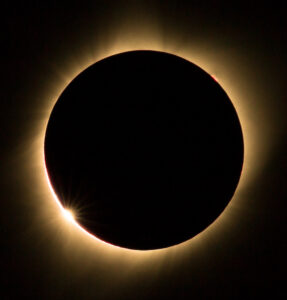 On April 8, a total eclipse of the sun by the moon will cross over the United States starting in Texas, and traveling through Oklahoma, Arkansas, Missouri, Illinois, Kentucky, Indiana, Ohio, Pennsylvania, New York, Vermont, New Hampshire, and Maine. According to the National Aeronautical and Space Administration (NASA), this will be the last total solar eclipse in the United States until 2044. So it’s worth it to get outside, weather permitting, to catch the solar eclipse if you can! But first, we have some very important safety tips.
On April 8, a total eclipse of the sun by the moon will cross over the United States starting in Texas, and traveling through Oklahoma, Arkansas, Missouri, Illinois, Kentucky, Indiana, Ohio, Pennsylvania, New York, Vermont, New Hampshire, and Maine. According to the National Aeronautical and Space Administration (NASA), this will be the last total solar eclipse in the United States until 2044. So it’s worth it to get outside, weather permitting, to catch the solar eclipse if you can! But first, we have some very important safety tips.
Viewing the Eclipse
- NEVER look directly at the sun during the eclipse, UNLESS it has reached “totality” in that the moon has completely covered the sun. As soon as it moves out of totality, you MUST use your solar viewers or speciality sunglasses to prevent damage to your eyes.
- Make sure your solar viewers/glasses are the ISO 12312-2 international standard and that there are NO scratches, tears, or other damage to them.
- Because the eclipse will concentrate the solar rays, wear sunscreen, a hat, and protective clothing as well.
- Do NOT look at the sun through regular sunglasses, no matter how dark they are.
- Do NOT look at the sun through binoculars, a telescope, a camera, or any magnifying device unless there are special solar filters fitted to the device for viewing solar eclipses.
Indirect Viewing
If you don’t have solar viewers/glasses, you can still watch the eclipse indirectly! Here’s a link to the American Optometrist Association’s pinhole projector. Alternatively, you can punch a hole in an index card and, and with your back facing the sun, you can view the eclipse through the hole onto another surface.
Symptoms of Incorrect Viewing
If you’ve accidentally caught the sun in your eyes during the eclipse, it may take a few hours or days to realize damage has occurred. This is an urgent situation, so contact All About Eyes straight away to help minimize long-term damage to your eyes. REMEMBER, the eclipse concentrates the sun’s rays. Here are a few things to watch out for:
- Loss of central vision.
- Distorted vision.
- Altered color vision.
Stay safe and happy viewing!

